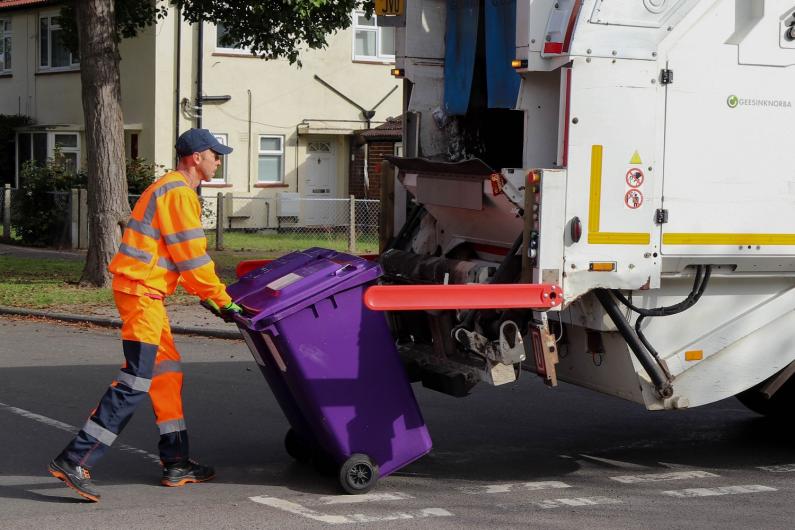
Proposals to change the frequency of bin collections in North Herts will be discussed at a special meeting of the council’s Overview and Scrutiny Committee on 28 September.
Waste, recycling and street cleansing services operate as part of a shared service with East Herts Council, who will also be meeting to consider similar service changes in the coming weeks.
In the current landscape of rising energy costs and other pressures on our budgets, it is predicted that emptying your purple bin for general waste every three weeks, instead of the current fortnightly cycle, would mitigate costs rising by around £270k a year, a substantial saving. Furthermore, three-weekly waste collections have shown to significantly benefit the environment and help fight climate change by reducing waste and harmful greenhouse gases:
- Fewer vehicles and miles would be needed for 17 collections a year as opposed to 26 – this would reduce carbon emissions by an estimated 60 tonnes, resulting in cleaner and better air quality (60 tonnes of carbon is equivalent to driving over 100,000 miles in an average car).
- Research shows extending the frequency of general waste collections would encourage people to recycle more and in turn reduce what we send to landfill.
- It will considerably help the council in working towards its target to become carbon-neutral by 2030, and for the district of North Herts to be carbon-neutral by 2040, improving our local environment for everyone.
An increasing number of councils in England and Wales already have three-weekly collections for general waste, with some in Wales and Scotland having monthly collections.
Any changes would not come into effect until 2025 when the current contract with Urbaser ends. Under the proposal in North Herts, food waste would continue to be collected every week, and recycling every fortnight.
The proposals are being considered by Overview and Scrutiny committee before being referred onto the council’s Cabinet on 25 October for a decision on the recommendations.
Cllr Amy Allen, Executive Member for Recycling and Waste, said: “At the moment a three-weekly general waste bin cycle is just a proposal, but we all need to do our bit for the planet, which includes looking at our food and waste habits – for instance using up fresh food before it’s too late, making sure any food waste goes in the food caddy, and recycling as much as we can at the kerbside and elsewhere.
“If the proposal is agreed by councillors, we know some households might need more support, such as those living in larger households, those with multiple children using disposable nappies, or people with other special waste needs, and we will have service options in place to help them.
“I’m also delighted to add that we are proposing to take plastic film/wrap also known as soft plastic in your grey recycling bin from 2025, which will further reduce waste in your purple bin.”
A series of cross-party workshops with local councillors from both North Herts and East Herts Councils helped shape the proposals, as well as the results from a recent public consultation. Residents were asked to tell us their recycling habits and among the results it was great to see:
- 76% of respondents said ‘I care about the environment and climate change and do my bit’.
- Nearly half (49%) of respondents’ purple bins for general rubbish are either half-full or quarter-full when it’s time to be collected – 18 people told us their bin was empty! – we therefore anticipate that that a large proportion of residents will be able to easily cope with the proposed extended frequency of general waste collections.
- 84% of respondents agreed the council should do more to make people recycle more and reduce waste and 74% of residents agreed the council should invest in or change services to reduce its carbon footprint.
Cllr Tom Tyson, Deputy Executive Member for Recycling and Waste, added: “We know the majority of people care about the environment and want to help fight climate change and the results of our survey help show this. It was very encouraging to find residents are thinking about their waste and considerably reducing the contents of their purple bin. To help residents recycle more, don’t forget to wash and squash plastic bottles, pots, tubs and trays, cartons and tins, and break cardboard down to make more room in your recycling bin.”
More information about Bins and recycling
Get the latest news by email
You can subscribe to get news and service updates by email. It's free, you can choose which topics you’re interested in and you can unsubscribe at any time.